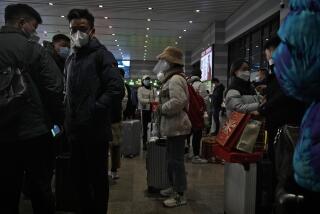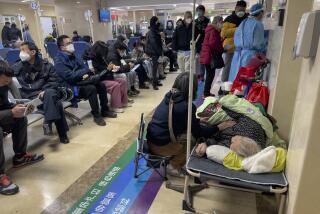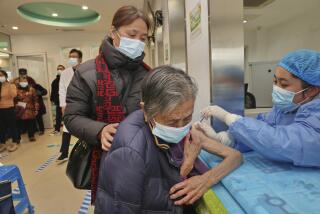Hong Kong Reports 5 More SARS Deaths
- Share via
HONG KONG — Five more patients with severe acute respiratory syndrome have died here, including four who were stricken while in good health yet failed to respond to treatment that has worked for others, health officials said Sunday.
The fatalities raised Hong Kong’s death toll to 40 and sparked concerns that the illness is able to kill younger, fitter patients who were previously thought to have a good chance of recovery.
Many of Hong Kong’s previous SARS victims had also suffered from chronic illnesses such as heart or kidney disease.
“Their situation fluctuated wildly when they were admitted into hospitals,” said Dr. Liu Shaohaei, a senior executive of Hong Kong’s Hospital Authority, speaking about the five latest victims.
The fitter patients, aged 40, 41, 45 and 52, “just kept deteriorating” despite being placed in intensive care, Liu said.
The fifth victim, a 66-year-old woman, had other chronic problems.
Three other SARS fatalities were reported Sunday in Singapore, bringing the global death toll to well over 100.
About 3,000 people worldwide have been infected, with most of the cases in Asia.
Still, Singapore’s government said primary schools would reopen today and secondary schools would reopen Wednesday, after having been closed since late last month.
“We are in this for the long haul,” Health Minister Lim Hng Kiang said when asked whether the virus was under control in Singapore.
The World Health Organization list of SARS-affected areas includes Beijing, Guangdong and Shanxi provinces in China; Taiwan; Singapore; Toronto and Hanoi.
Canada said its death toll rose to 13 over the weekend, while there were more than 270 probable or suspected cases of infection. Thousands of people have been quarantined.
A laboratory in Canada announced over the weekend that it had completed the genetic sequencing of the coronavirus believed to cause the disease.
The information from the Michael Smith Genome Sciences Center in British Columbia could help scientists determine whether the coronavirus -- part of a family that includes forms of the common cold -- is the source of SARS.
More to Read
Sign up for Essential California
The most important California stories and recommendations in your inbox every morning.
You may occasionally receive promotional content from the Los Angeles Times.













